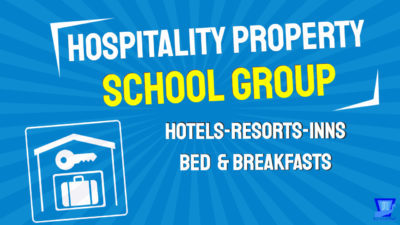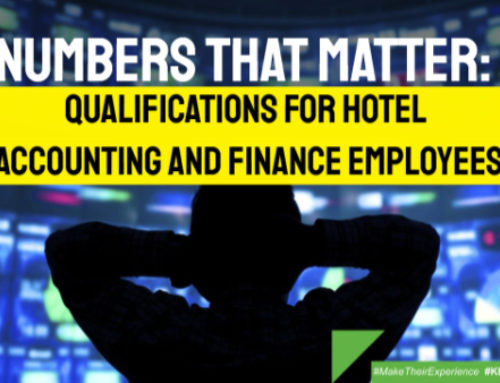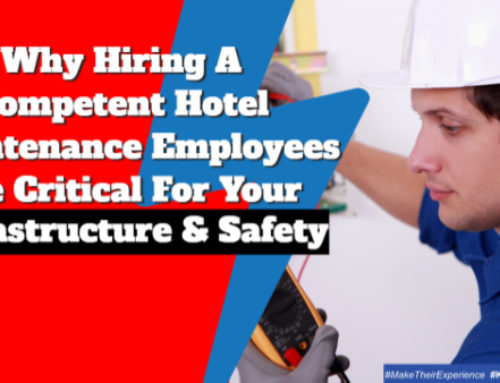Employee turnover in the last couple of years has been chaotic, and if it has been happening to you, you are losing money.
Here’s why hotel employees quit and how to turn things around.
Welcome to another edition of Hospitality Property School.
I am your instructor, Gerry MacPherson.
.
.
Turnover rates in the hospitality industry have grown in past years, in some sectors up to 70% and this includes the hospitality property sector.
.
Turnover can impact everything from staff morale to a property’s ability to deliver consistent guest experiences, to budget and overall profit margins.
.
While there are many factors that contribute to an employee’s decision to leave, it’s up to property owners and managers to take corrective action.
.
Research has shown that owners, managers, and executives polled believe an improved employee experience is important, only 22% reported that their properties excel in making this a priority.
.
There are hospitality property owners and managers out there who are doing things the way it has always been done because that is the way it has always been done.
.
Over the years, these owners, or managers might have driven their best people away and will continue to do so until they spot the connection between policies, passion, performance, and profits.
.
This is what I mean:
- The more policies, the less passion you’ll get from your team.
.
- The less passion, the less exciting the team’s performance will be.
.
- The less exciting the performance, the lower your profits will be.
.
Make sense?
My list of rules that do drive great employees away
Attendance Policies
Salaried people don’t need attendance policies. That’s why they’re on salary. If you’re still dinging people for getting to work ten minutes late when they commonly stay an hour late every day, you don’t deserve them on your property.
.
.
Dress Code Rules
If you supply uniforms, this is not an issue, but if not, get rid of the insultingly detailed dress code policy and simply remind your employees to dress for business.
.
You can add, “If you’re on the fence about whether to wear a particular ensemble or article of clothing to work, err on the side of caution and don’t wear it.
.
.
Bell Curve Performance Reviews
Performance reviews in general are a bureaucratic waste of time, but the ones that force managers to fit their teammates into pre-set slots on a bell curve are disgusting and unworthy of the brilliant people on your staff.
.
If you truly don’t trust your managers to hire wonderful employees, why did you make them managers? Bell curve performance reviews only encourage the hiring and retention of so-so employees, or worse.
.
.
Bereavement-Leave Policies
There are still employers that require their employees to bring in funeral notices to be eligible for a few days’ paid bereavement leave.
.
That’s shocking and horrifying.
.
No doubt some employees way back when falsified a family death to get some time off, and ever since then the company has been writing its policies to prevent such a fraud from re-occurring.
.
That’s idiotic and heartless. It’s never smart to write policies directed toward people you wish you hadn’t hired. Trust your employees, and they’ll trust you back.
.
.
Approvals for Everything
Do we really need a manager’s written approval for an employee to replace their ID badge?
.
We have taken nearly all the latitude away from the talented adults we hire. More bureaucracy only slows us down.
.
Can we trust the people we chose to join our team to do simple things like taking care of customer issues on the spot without requiring a manager’s written permission? If not, can we call ourselves leaders?
.
.
Disciplinary Rules
The idea of discipline comes from the military. We doubt that it would ever be appropriate to put our kids’ piano teacher or our plumber on probation, so why would we do that to the employees on our teams? The idea of progressive discipline makes no sense in the knowledge economy we operate in now.
.
We are all adults. If someone goofs up, we can have a conversation about it. We can figure out where things broke down and if we don’t trust a person to represent our brand, what good will probation or a written warning do?
.
.
Feedback Mechanisms
Employee Engagement is a crock and a slap in the face to your teammates, most of whom would be happy to tell you to your face what your company is doing right and wrong. All you have to do is walk up to them and ask them, face to face, and listen to what they have to say.
.
Annual employee engagement surveys are a paper pusher’s answer to the question “How are we doing, and how’s the team?”
.
Do you ask your husband or wife to fill out a survey and tell you how you’re doing as a partner? They’d have a sharp answer for you if you proposed that approach.
.
Why should the valued collaborators you work with see things any differently? Lose the engagement survey and make it easy for your teammates to tell you what’s working and what isn’t, at the moment.
.
.
Hiring Processes
It’s easy to fill job openings when you do these three things:
- Write job descriptions in English or your local language rather than corporate zombie speak.
.
- Treat job applicants like valued collaborators, rather than interchangeable machine parts or pieces of meat.
.
- Make the interview process fast and friendly, and remember that job candidates need to be sold as vigorously as your customers do.
Any employer that complains about talent shortages is barking up the wrong tree. Humanize your recruiting process and watch the talented people flow in!
.
.
Forced Ranking
Forced ranking, sometimes call stack ranking, is a process of lining up your employees and comparing them to one another—Best to Worst. It’s easily the dumbest idea corporate and institutional paper pushers have ever come up with.
.
You can’t stay and work for a company that treats like you like a two-by-four stacked up against other pieces of lumber, not when there are wonderful organizations that could use your help!
.
Your teammates deserve better. People are unique and whole in themselves. There is nothing to compare between one person and another — thank goodness! Smart employers have always known this, and any organization that doesn’t get it doesn’t deserve the talents of great employees.
What can you do in making a happier, more engaged team?
I’ll look at three strategies that have been shown to immediately improve your employee’s experience, productivity, and a brand’s bottom line.
- Connect with your employees the right way
.
- Empower employees with meaningful feedback
.
- Show the benefits of automation
.
.
Connect with Your Employees the Right Way
One of the most damaging by-products of turnover is employee detachment.
.
If employees are not invested in a hospitality property’s mission and brand, they can’t provide a memorable experience. They need the right tools to remain involved and to feel empowered to do what they do best.
.
On average, only 3 in 10 hospitality industry employees feel they have the appropriate tools to be productive. But with the right investment, if you double your employee count to 6 in 10, you could easily realize a 27% increase in overall employee work quality and an 11% increase in profitability. An investment in the right tools would pay for itself in no time.
.
To establish what’s most valuable to your employee in their daily lives, you require an effective feedback loop.
1. Your employees need to believe their job has purpose and value, and to achieve this you have to provide a genuine and relatable explanation about the importance of your company goals.
.
2. You have to get to know your employees and learn their pain points. Give them a chance to voice what they believe the solutions are. They might have the solutions.
.
3. Study and document in your operations manual, each job on your property, so you can find benchmarks to measure against.
.
4. Observe your property’s top-performing employees and leverage their talent and insight into your training. Ask them to help you develop best practices you can immediately apply.
.
5. From there, research and invest in the right tools and materials that would be most effective in raising each benchmark you identify.
.
What is the next step?
.
Repeat steps 1 – 5.
.
If you can maintain this cycle, your employees will be happier and feel motivated to put forth their best efforts for you.
.
.
If you are a member of the Hospitality Property School Group, as a bonus, I’m going to share how to empower employees with meaningful feedback.
.
.
In Conclusion
Trust your employees & watch what happens!
.
As leaders, we have many pathways to help our team members. What is the best approach? That may depend on the individual. Regardless of the path, we choose to be helpful, when we believe in the people with whom we work, it can be magical.
.
Leaders are signal senders. We can foster the confidence of individuals and teams through our trust and belief in them.
.
As leaders, let’s be aware of the beauty and power of our signal of trust.
.
Let’s empower them. They will respond with a strong desire to live up to your belief in them and they will do their very best. And that is highly effective leadership!
.
Connecting with your employees the right way, empowering your employees with meaningful feedback and showing them the benefits of automation are three ways that have proven successful in lowering employee turnover and increasing your profit.
.
You can’t afford to ignore these practices.
.
Do you empower your employees?
Let me know how in the comments.
.
.
We cover more on organizational structure in “The Guide to Owning & Operating a Hospitality Property – Successfully” book & course. You find more information at KeystoneHPD.com
You will have access to this episode for as long as you would like, but if you would like to see all the bonuses you would have access to as a member of the Hospitality Property School Group, check out the short video in this episode post-show notes.
.
.
In our next episode, I will be talking about Recruiting the Right Hotel Employees.
.
That’s it for today’s episode,
Until next time, have a fun day.
.
If you haven’t done so yet, make sure to sign up for the INNsider Tips, say hi on social and join one of our groups. And make sure you get your free copy of the “How to Improve Your Hospitality Properties Success” e-book.
.
You can find all the links in the show notes.
.
⇒ TO READ OR LISTEN TO THIS EPISODE ON KEYSTONE HOSPITALITY PROPERTY DEVELOPMENT:
https://keystonehpd.com/why-hotel-employees-quit-what-you-can-do-316
.
“The Guide to Owning & Operating a Hospitality Property – Successfully” course.
https://KeystoneHPD.com/Course
.
.
Did you get your copy of the “How to Improve Your Hospitality Properties Success” ebook?
KeystoneHPD.com/How-to-Improve-Your-Hospitality-Properties-Success
.
.
.
Get Your INNsider Tips
.
.
Join one of your private groups
https://keystonehpd.com/private-groups
.
.
Say hi on social
Facebook: https://www.facebook.com/KeystoneHPD
.
Twitter: https://twitter.com/KeystoneHPD
.
LinkedIn: https://www.linkedin.com/company/keystone-hospitality-development
.
.
Listen to The Hospitality Property School PODCAST here
keystonehpd.com/hospitality-property-school-podcasts
.
.
YouTube
.
.
A Division of Keystone Hospitality Property Development









